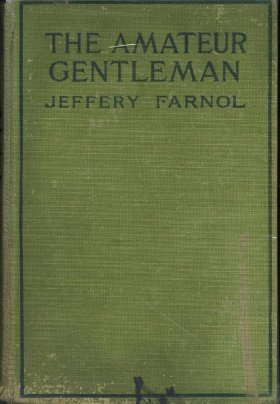"Well then, you must know, then, his uncle, my scapegrace brother
Tom—you'll mind Tom as sailed away in a emigrant ship—well, Natty
Bell, Tom has took an' died an' left a fortun' to our lad here."
"A fortun', John!—how much?"
"Seven—'undred—thousand—pound," said John, with a ponderous nod after each word, "seven—'undred—thousand—pound, Natty Bell, and there y' are."
Natty Bell opened his mouth, shut it, thrust his hands down into his pockets and brought out a short clay pipe.
"Man Jack," said he, beginning to fill the pipe, yet with gaze abstracted, "did I hear you say aught about a—gentleman?"
"Natty Bell, you did; our lad's took the idee into his nob to be a gentleman, an' I were trying to knock it out again, but as it is. Natty Bell, I fear me," and John Barty shook his handsome head and sighed ponderously.
"Why then, John, let's sit down, all three of us, and talk this
matter over."
CHAPTER II
IN WHICH IS MUCH UNPLEASING MATTER REGARDING SILK PURSES, SOWS' EARS, MEN, AND GENTLEMEN
A slender man was Natty Bell, yet bigger than he looked, and prodigiously long in the reach, with a pair of very quick, bright eyes, and a wide, good-humored mouth ever ready to curve into a smile. But he was solemn enough now, and there was trouble in his eyes as he looked from John to Barnabas, who sat between them, his chair drawn up to the hearth, gazing down into the empty fireplace.
"An' you tell me, John," said he, as soon as his pipe was well alight,—"you tell me that our Barnabas has took it into his head to set up as a gentleman, do you?"
"Ah!" nodded John. Whereupon Natty Bell crossed his legs and leaning
back in his chair fell a-singing to himself in his sweet voice, as
was his custom when at all inclined to deep thought:
"A true Briton from Bristol, a rum one to fib,
He's Champion of England, his name is Tom Cribb;"
"Ah! and you likewise tell me as our Barnabas has come into a fortun'."
"Seven—'undred—thousand—pound."
"Hum!" said Natty Bell,—"quite a tidy sum, John."
"Come list, all ye fighting gills
And coves of boxing note, sirs,
While I relate some bloody mills
In our time have been fought, sirs."
"Yes, a good deal can be done wi' such a sum as that, John."
"But it can't make a silk purse out of a sow's ear, Natty Bell,—nor yet a gentlemen out o' you or me—or Barnabas here."
"For instance," continued Natty Bell, "for instance, John:
"Since boxing is a manly game,
And Britain's recreation,
By boxing we will raise our fame
'Bove every other nation."
"As I say, John, a young and promising life can be wrecked, and utterly blasted by a much less sum than seven hundred thousand pound."
"Ah!" nodded John, "but a sow's ear aren't a silk purse, Natty Bell, no, nor never can be."
"True, John; but, arter all, a silk purse ain't much good if 't is empty—it's the gold inside of it as counts."
"But a silk purse is ever and always a silk purse—empty or no,
Natty Bell."
"An' a man is always a man, John, which a gentleman often ain't."
"But surely," said Barnabas, speaking for the first time, "a gentleman is both."
"No—not nohow, my lad!" exclaimed John, beginning to rasp at his
chin again. "A man is ever and allus a man—like me and you, an'
Natty Bell, an' a gentleman's a gentleman like—Sir George

























